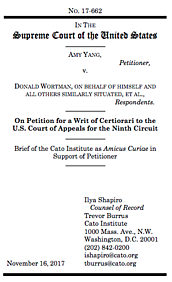Learn more about Cato’s Amicus Briefs Program.
Class actions allow a single plaintiff, or group of plaintiffs, to represent the interest of a larger “class” of people with the same or similar legal claims. In practice, such cases are driven not by the actual plaintiffs, however, but by lawyers who conceive and control the lawsuit—and too often reap an outsized portion of the rewards. Allowing lawyers to negotiate on behalf of people who don’t even know they’re being represented creates opportunities for self-dealing, where the lawyers sell off the legal rights of absent class members in exchange for hefty attorney fees. Because of these potential conflicts of interest, courts are called upon to police class actions to a far greater extent than they are in the course of other litigation.
Amy Yang is one of these exploited absent class members. She objects to the settlement of a set of antitrust actions against various airlines serving routs between the U.S. and Asia, alleging a price-fixing conspiracy. The problem is that the certified class includes members who have no real chance of recovery at trial: those who purchased their tickets through a third party (think Expedia or Orbitz) and those whose flights originated abroad. Under the antitrust laws, only those who directly purchased tickets from airlines for flights originating in the United States are eligible for recovery, yet those sure losers are included in the class on an equal basis with as valid claims. Indeed, most of the class is probably ineligible for recovery, since most people buy tickets through third-party websites these days rather than directly from the airline.
But a larger class means a larger fee, and so the plaintiff’s lawyers—known as “class counsel”—weighed the class down with bogus claims to inflate their own payday. This is great for the lawyers, but it comes at the expense of class members with legitimate claims, who see their recovery diluted to make up the difference. Yang, represented by the Competitive Enterprise Institute’s Center for Class Action Fairness, has asked the Supreme Court to put a stop to this skullduggery. Cato filed a brief urging the Court to take the case. Our brief focuses on the constitutional imperative that courts effectively police the class-action system to ensure that all citizens are afforded constitutional due process. To do otherwise would place all our legal rights in the hands of the plaintiffs’ bar, to be auctioned off so they can buy beach houses and sports cars.

This work is licensed under a Creative Commons Attribution-NonCommercial-ShareAlike 4.0 International License.



